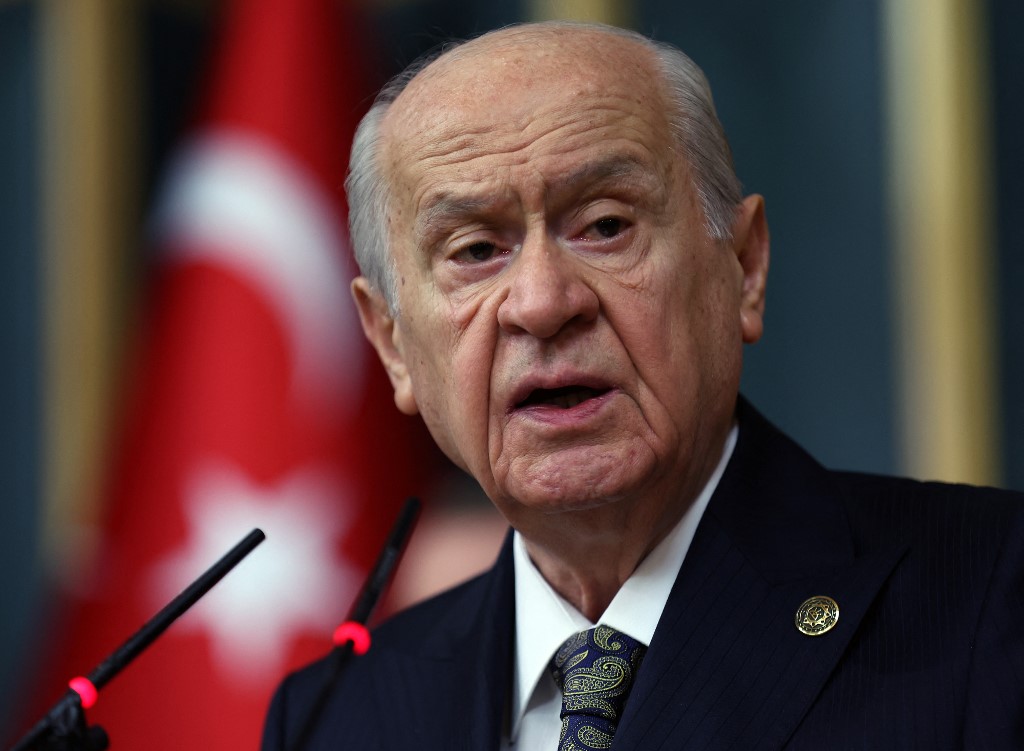Nationalist Movement Party (MHP) leader Devlet Bahçeli, Turkish President Recep Tayyip Erdoğan’s far-right ally, has called for the termination of the Turkey-EU agreement on the readmission of migrants.
This marks a significant shift in his stance on migration and could signal emerging tensions within his alliance with President Erdoğan.
In an address to the Turkish Parliament on Tuesday, Bahçeli emphasized the need for Turkey to end the readmission agreement, which mandates the return of migrants who entered Europe through Turkey.
“The demographic stability and future of our nation are at risk from dangerous migration flows. We must break the back of irregular migration and end the readmission agreement,” he said.
Bahçeli’s remarks stand in contrast to the policies of Erdoğan, whose government has implemented a limited return scheme for Syrian refugees, opposing the full deportation promised by the opposition in the run-up to last year’s general election. Erdoğan’s ruling Justice and Development Party (AKP) has been in a contentious debate with opposition parties over the handling of migrants and refugees.
“The voluntary, safe, and honorable return of Syrian refugees under temporary protection in our country should be ensured step by step,” Bahçeli said, aligning with the broader public sentiment against large-scale migration but diverging from the government’s official stance on managed returns.
The main opposition Republican People’s Party (CHP) as well as nationalist opposition parties have campaigned on the promise of repatriating all migrants, a stance that gained traction in recent elections. Bahçeli’s call to scrap the readmission deal could further embolden these opposition promises and increase pressure on Erdoğan’s administration to take a harder line on migration.
Bahçeli also touched on the recent European Parliament elections, criticizing the EU’s handling of migration and its approach towards Turkey. He called for a new, balanced relationship between Turkey and the EU, free from double standards.
“Relations between Turkey and the EU have not progressed in a stable, good-willed and unbiased manner,” Bahçeli said.
This development comes as Turkey grapples with the social and economic impacts of hosting nearly 4 million Syrian refugees. The public discourse on migration has become increasingly polarized, with nationalist rhetoric gaining ground.
Bahçeli’s shift in tone may indicate internal divisions within the AKP-MHP alliance, potentially challenging the cohesion of Erdoğan’s administration. The MHP’s call to terminate the readmission agreement comes amid growing nationalist pressure to adopt more stringent migration policies amid rising public discontent.
Bahçeli says Syrian Kurdish elections justify Turkish military intervention
Bahçeli also addressed the situation in Syria, specifically condemning the Kurdish-led administration of the Syrian Democratic Forces (SDF) in northeastern Syria for planning local elections, which he views as a step towards legitimizing a separatist state.
“We are absolutely against the division, fragmentation and disintegration of the Syrian Arab Republic. Meddling with its territorial integrity and administrative structure to establish legitimate grounds for the separatist terrorist organization through so-called democratic maneuvers is a just cause for Turkish military intervention,” Bahçeli declared.
The Kurdish-led autonomous administration in Syria, which is organizing the elections in August in the northern and eastern provinces of Syria, including Hassakeh, Raqqa, Deir el-Zour and parts of Aleppo, sees them as a step towards greater self-governance. However, Turkey perceives these elections as a move towards the establishment of an independent Kurdish entity, which it views as a direct threat to its national security.
The SDF’s planned elections come amid ongoing instability in Syria. Erdoğan accused the Kurdish groups of intensifying their efforts to establish control over the region through coercion and violence.
Bahçeli criticized governments of the regional countries and Russia for their silence on these developments and reaffirmed Turkey’s readiness to defend its national security.
“We are alert and prepared to thwart those dreaming of a terrorist state along our southern border. The security of Syria and Iraq is directly linked to the security of Turkey,” Bahçeli said.
Turkey has long opposed the presence of Kurdish militias along its border, accusing them of being linked to the Kurdistan Workers’ Party (PKK), a group that has waged an insurgency against Turkey since 1984. The PKK is designated as a terrorist organization by Turkey and its Western allies. However, the People’s Protection Units (YPG), the main Kurdish militia in Syria and a key component of the SDF, has been a crucial ally for the United States in the fight against the Islamic State in Iraq and the Levant (ISIL).
Turkey has conducted several military operations in northern Syria since 2016, aiming to push Kurdish forces away from its border and create a buffer zone.

